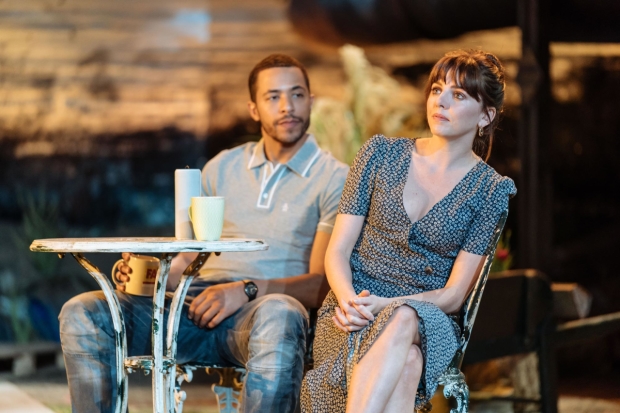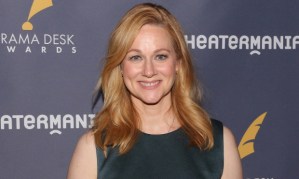Review: Nightfall (Bridge Theatre)
Ophelia Lovibond and Claire Skinner star in Barney Norris’ new play about grief

© Manuel Harlan
You can't move for Brexit metaphors in Barney Norris' new play. There's the failing family farm split down the middle by a massive corporate oil pipe. There's the sun lounger sat on a lawn turned to mud. And then, there's the family stuck in the past, stopped by their grief: the lost father, who wasn't as great as their memories serve; the middle-aged mother whose choices dictate her children's lives; the two siblings torn between leaving and staying put. Nightfall's so intent on summing up the state of the nation, it almost forgets how to function as a play.
It's a shame. In both his plays and his novels, Norris has proven himself a writer of genuine finesse; one who carves out his characters with real care and sensitivity. There are flashes of that in Nightfall, and its best moments shine shards of light upon grief: the desperate urge to remember against the desire to move on; the way it makes us cling that much harder to what we've got left; the disorientating way the world keeps on turning, no matter your turmoil. Ophelia Lovibond's Lou rages impotently that, while the world remembers 2016 for the EU referendum, to her it is solely the year that took her father's life.
Only, the political overrides the personal in Norris' play too. For all grief underpins the action, it's suffocated by symbolism. To offset the rising debts of their near-fallow farm, Sion Daniel Young's Ryan starts siphoning oil from the pipeline with his oldest friend Pete (Ukweli Roach). "You need to take what you can get," he insists, with a gleeful sense "or you'll be f***ed." That one action suggests a cash-strapped nation on the make.
Recently released from prison, having seemingly landed a late-night punch that left a young man in a wheelchair, Pete's rekindling his relationship with Ryan's sister Lou, despite her initial discomfort at his return. When he proposes unexpectedly, a job offer waiting for him in Dubai, it leaves Ryan and Lou's grief-stricken mother Penny all but bereft. Teetering on the edge of a drinking problem, too distraught to see sense and sell up, she manipulates her kids into staying put and forces farming on them to preserve their father's legacy.
At heart, Nightfall's built around a run of rash, but irreversible decisions – most of which go completely awry. Even the oil pipe itself, a blight on the landscape, was installed to get one over on the landowner next door, and, once it's been tapped, there's no going back: "The damage is done." The same goes for spontaneous proposals and hot-headed punches (whoever threw them): decisions taken in one moment can define a whole life.
A whole country too, Norris suggests, and it's pointed how easily his characters are manipulated. Jenny's taste in wine changes according to what's on Saturday Kitchen – and even that's "not as good now James Martin's left." The implication is that we're so used to swallowing advertising, Brexiteers voted to leave like a herd of hypnotised lemmings. For all Nightfall sets out to sympathise, it ends up rather smug: one big 'Told you so.'
That might hit harder or manage more humanity if Laurie Sansom's staging weren't quite so old-fashioned – and not in an ironic, backwards-looking way either. Rae Smith's clapped-out bucolic design, for all its rusty, mud-splattered detail, is artificial enough to sit in a model shop, and Gareth Williams' generic pastoral score has more than a hint of Hovis ad to it.
Sansom's cast are certainly characterful – Daniel Young is nicely rudderless as Ryan, torn between anger, action and fear, Roach routinely upturns expectations as the upstanding ex-con, and Lovibond brilliantly conveys the bungee chord pull of home and family while itching for a fresh start. Claire Skinner is skittish and half-there, but she struggles to summon the agony of grief. Even so, the rhythms are out: Sansom goes heavy on sentiment and light on dramatic flashpoints, and this farming drama gets bogged down by Brexit.


















